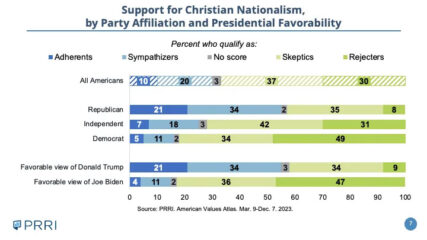.pod-stream-buttons {
display: flex;
justify-content: center;
margin-bottom: 1.5rem;
}
.post-thumbnail {
display: none;
}
.stream-button {
flex: 1 1;
margin-right: 0.5rem;
}
.stream-button:last-child {
margin-right: 0;
}
.stream-button a {
display: flex;
}
.stream-button object, .stream-button img {
width: 100%;
height: 100%;
}
.wp-remixd-voice-wrapper {
display: none !important;
}
It happened exactly four years ago.
I am speaking of Jan. 6, 2021 — the attack on the U.S. Capitol Building by supporters of Donald Trump — claiming that then-President-elect Joe Biden had stolen the election. It was, to quote Bill Kristol, our national day of shame. It was, to borrow FDR’s iconic phrase, a day that will live in infamy.
There were many things that we cannot unsee, and that we cannot unhear.
Among the rioters who stormed the Senate chamber was a man who provided us with one of the most memorable and disturbing images of that dark day in American history. A bare-chested, self-styled “shaman” named Jacob Chansley was wearing a horned helmet. At a certain moment, he removed that helmet, and he led the group in prayer:
Thank you heavenly father for gracing us with this opportunity … to allow us to exercise our rights, to allow us to send a message to all the tyrants, the communists, and the globalists, that this is our nation, not theirs. We will not allow America, the American way of the United States of America to go down. … In Christ’s holy name, we pray.
That was a demonstration of Christian nationalism — the subject of our podcast with Amy Spitalnick, the CEO of the Jewish Council for Public Affairs — a powerful national voice on issues of democracy, antisemitism, extremism and hate.
In our conversation, you will learn that Christian nationalism poses three threats — to America, to Jews and other religious minorities, and even to Christianity itself. (Many Christians themselves recognize this; check out this interview with Amanda Tyler, author of “How to End Christian Nationalism.”)
Christian nationalists believe that the United States is fundamentally Christian, that Christian values must define American government and public life and that God has called Christians to exercise dominion over all areas of American society.

Let us be clear. People of faith have always brought their religious beliefs into the public square, in noble efforts to influence the public good. That is an honored part of American life — whether it be the Rev. Martin Luther King Jr. or Rabbi Abraham Joshua Heschel or the Reform movement’s Religious Action Center — with its emphasis on “religious.” It is impossible to imagine the abolitionist movement, the Civil Rights Movement and various anti-war movements without their religious voices and influences.
But, first: There is the danger to America. Christian nationalists would use political power to break down the separation of church and state — the bedrock principle ensuring freedom of religion — and further align laws on social issues with evangelical religious doctrine. This is the deliberate destruction of American religious freedom — to quote Amy, “the democratic norms and values that have made the United States the safest place for Jews in much of our history.”
Second, this is dangerous to American Jews, and others.
As Amy says: “When people tell you what they plan to do, believe them.” Christian nationalists have made it abundantly clear what they, and others, plan to do: more stringent bans on access to women’s health care, including abortion; same-sex marriage, free access to contraceptives and other things. If they have their way, there would be more laws that would require that the Ten Commandments be displayed in public school classrooms, school prayer, etc.
The vast majority of American Jews, as well as many others, would be opposed to such measures.
Christian nationalism is, at its heart, antisemitic. A 2021 Washington Post survey found a high correlation between Christian nationalist principles — for example, “The federal government should declare the United States a Christian nation” — and antisemitic tropes, such as that the Jews killed Jesus, that Jews have too much power in the business world and that American Jews have dual loyalty to the U.S. and Israel. To paraphrase a 2023 study, “Are Christian nationalists antisemitic and why?”: There are links between Christian nationalism and antisemitic conspiracy theories, such as QAnon. They are anti-elitist and anti-intellectual, which often translates into antisemitism.
It is not just antisemitic. It is generically xenophobic — suspicious of “outsiders” and authority. Jews never fare well in such environments. There is no place for Jews, Muslims, Hindus, Buddhists, etc. in a Christian nationalist America.
Finally: Christian nationalism is not good for Christianity.
Christian nationalists see themselves as victims. As Marcia Pally has written: “The forebears of today’s evangelicals brought the heritage of religious persecution by European states and state churches, which encouraged trust in one’s own community and wariness of authorities and outsiders.” They see themselves as an aggrieved minority, always on the verge of losing their rights, and their cultural power (cf. the fictitious “war on Christmas”).
Forgive my chutzpah, but this is not good Christian theology. On the face of it, Christianity seems to begin in an act of victimization — the death of Jesus on the cross.
But, in fact, Jesus was not merely a victim, and not only a victim. He freely offered himself — a self offering of love. As any believing Christian will tell you, Christianity does not begin on Good Friday — with the crucifixion. It begins on Easter Sunday — with the resurrection — with hope conquering despair, with life vanquishing death.
There is that famous curse: “May you live in interesting times.” We are living in such times. Trump’s upcoming decision on which Jan. 6 insurgents will be pardoned will tell you almost all you need to know about what America could look like.
This is a time for faith — active faith. As Robert Wuthnow wrote, the role of religion in a democracy is to bring a multitude of voices into the conversation, to allow a free discussion and even struggle over shared values and visions on what it means to be a democracy.
That is precisely what we need — now, more than ever.








